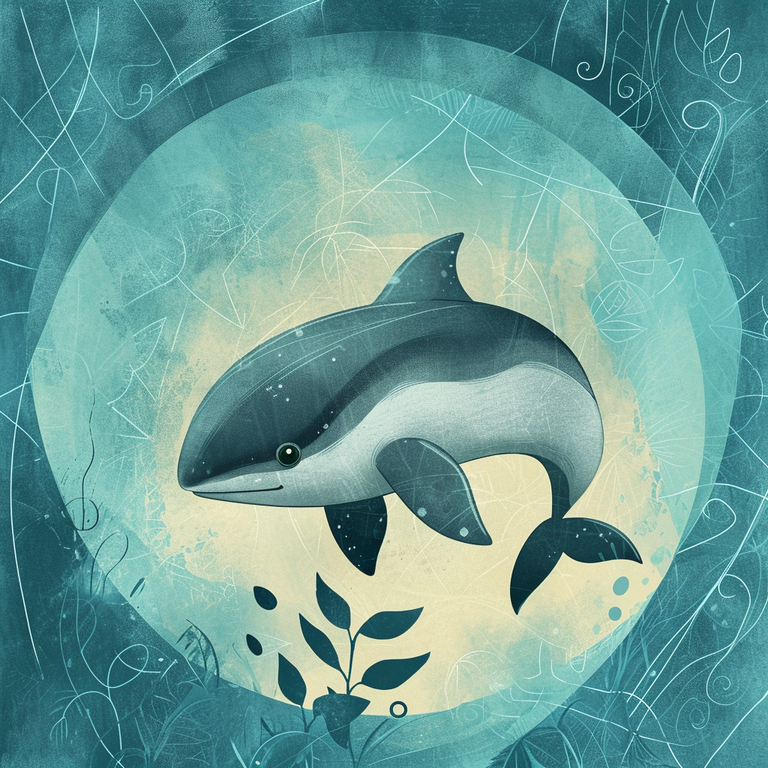Endangered Vaquita: A Race Against Extinction
Introduction
The Vaquita (Phocoena sinus), the world's smallest marine cetacean, is critically endangered. With an estimated population of only 6-19 individuals in 2023, this elusive and shy mammal is on the brink of extinction, largely due to human activities.
Physical Characteristics and Habitat
The World’s Smallest Marine Cetacean
- Size and Appearance: The Vaquita averages 4.5-5 feet in length and weighs about 120 pounds.
- Distinctive Features: Characterized by large, dark rings around its eyes and dark patches on its lips.
- Coloration: Dark gray dorsal surface, paler gray sides, and a white underside with light gray markings.
Habitat: Exclusive to the Gulf of California
- Geographical Range: Found only in the northern Gulf of California (Sea of Cortez) in Mexico.
- Environment: Prefers shallow waters and feeds on small fish and squid.
The Plight of the Vaquita

(Image - MidJourney)
Major Threats
- Illegal Fishing: Primary threat due to gillnets used for the totoaba fish, leading to accidental bycatch.
- Habitat Degradation: Construction of dams, canals, and pollution affects their environment.
Population Decline
- Alarming Numbers: From approximately 600 in 1997 to as few as 6-19 in 2023.
- Reproduction: Sightings of mother-calf pairs offer a glimmer of hope.
Conservation Efforts
Key Actions
- Ban on Gillnets: Most critical measure for Vaquita conservation.
- Enforcement of Fishing Regulations: Increased surveillance to prevent illegal fishing.
- Promotion of Alternative Fishing Methods: Encourages sustainable fishing practices.
- Surveys and Monitoring: Essential for tracking the population and formulating strategies.
International Collaboration
- Involvement of the United States and Mexico in developing Vaquita-safe fishing technologies.
- WWF's initiatives like 'Ghost Net' retrieval and advocacy for gillnet bans.
Our Role in Vaquita Conservation
How We Can Help
- Support Conservation Groups: Donate or volunteer with organizations like WWF or Sea Shepherd Conservation Society.
- Advocate for Sustainable Practices: Encourage responsible seafood consumption.
- Raise Awareness: Share information about Vaquita's plight.
- Educate and Advocate: Inform others and support legislation protecting marine wildlife.
Hope for Tomorrow
- Reduced Gillnetting: Crucial for the survival of the Vaquita.
- Innovative Fishing Practices: Sustainable methods for local communities.
- Global Effort: International collaboration and policy support are essential.
Scientists race to save vaquita on brink of extinction
The Mexican Navy and Sea Shepherd Patrol are collaborating to protect the vaquita, a highly endangered marine mammal in the Gulf of California. Recent surveys indicate a stable vaquita population over the past two years, which is a positive sign for conservation efforts.
The Navy has been effective in deterring illegal fishing in the no-fishing zone by using concrete blocks and hooks. This has helped to create a safe haven for the vaquita, which is one of the smallest cetaceans in the world.
Despite these conservation efforts, the vaquita remains on the brink of extinction. There are only an estimated 30 vaquitas left in the wild, and their numbers are declining. The primary threat to the vaquita is bycatch in gillnet fishing operations.
Scientists are working to develop new technologies to reduce vaquita bycatch. They are also working to raise awareness about the vaquita and the need to protect it.
Conclusion
The Vaquita's Critical Situation: A stark reminder of the impact of human activities on marine life and the urgent need for global conservation efforts.
Call to Action for Conservation
- Individual Involvement: Your actions can make a difference in saving the Vaquita.
- Global Responsibility: International cooperation is vital in this conservation battle.
The Vaquita's situation is a critical reminder of the impact our actions have on the environment and the importance of concerted global efforts in wildlife conservation.
More Information
For a deeper understanding and ways to contribute, resources like the Porpoise Conservation Society, Sea Shepherd Conservation Society, and World Wildlife Fund (WWF)World Wildlife Fund (WWF) offer valuable information and avenues for action.
Sources for further reading:
Porpoise Conservation Society and Sea Shepherd Conservation Society.
Image created in midjourney, I hold a commercial license.
#kindness #cwh #conservation #endangered #ecency #community #wildlife